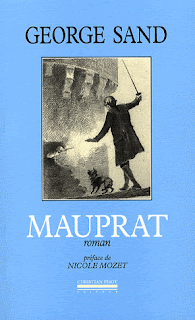There is a reason this plot found itself expressed in a children's fairytale. It is far too naive and simplistic, yet it teaches small kids to be good, compassionate, caring, and understanding. However, when it comes to adult novels, I believe such a moral is rather simplistic, shallow, and naive. That is why, I was highly disappointed by George Sand's novel Mauprat.
In Mauprat Sand portrays a young savage man, Bernard, who grew up without proper education or percepts, under the negative influence of his uncles - evil and cynical outlaws. When he meets his cousin Edmond, he falls deeply in love with her but throughout the novel she keeps rejecting him due to his imperfect nature. However, Bernard views her as the most beautiful, most perfect, and most innocent woman and swears to love no other until he dies. So far so good, although I don't really buy this part either. Sand draws a rather idealistic portrait of Edmond - she is caring, loving, smart, and wise. Edmond uses her love to transform Bernard from an intemperate, violent, and rude individual into a man she could actually fall in love and live with. Despite her strange, inconsistent, and at some points really annoying behavior, Bernard patiently bears everything to reach the expected happy end of the novel.
Amantine Aurore Lucile Dupin was born in the beginning of the 19th century in a noble family. In her time she was a model of modern and emancipated woman: she dressed in male clothes to overcome the strict social restrictions on women and get access to places, forbidden even for her social standing - a baroness; she smoked tobacco in public and she wrote under the pseudonym George Sand. Due to the unorthodox aspects of her life, she had to give up some of her privileges as a baroness. Faithful to her beliefs of the importance of love impulse and desires of the heart and soul over the smothery rules of society, she even divorced her husband in 1846. Sand participated in the revolution of 1948, fascinated by the spread of democratic ideas in France (obvious in her novel as well)
Although I admire Sand's lifestyle and choices, I wasn't impressed or touched by her novel. In Mauprat the author mixes love, philosophy, and sense of family idyll to arrive at yet another romantic story about the power of love to transform and humanize even the most evil individuals. She is highly optimistic and believes in human virtues, the power of proper education, and the saving role of the woman The novel is a light and easy reading and I must admit it is quite interesting. However, I still find it too idealistic and trivial for my taste. I don't believe in human transformation only due to strong and compassionate love. Bernard's idea of Edmond's virtues is exaggerated and we get a portrait of an ideal angel, rather than a true human being with its flaws and defects. In addition, throughout the novel Edmond acts inconsistently, only for the reader to understand at the end that she in fact loved Bernard.
Finally, if I could meet George Sand, I would ask her some important questions: "How can a woman love a man so much and still want to change him completely? Does this mean she doesn't love his present self and she just wants to transform him into someone she can live with and respect? Isn't true love accepting someone for his virtues and flaws altogether?"
Definitely something to think about. Still, if you fancy a light, positive novel about the power of female love, you might as well try out George Sand's Mauprat. I have to warn you, though, do not expect a masterpiece.
@ Amazon: Mauprat

No comments:
Post a Comment